Theatre
I Want a Country
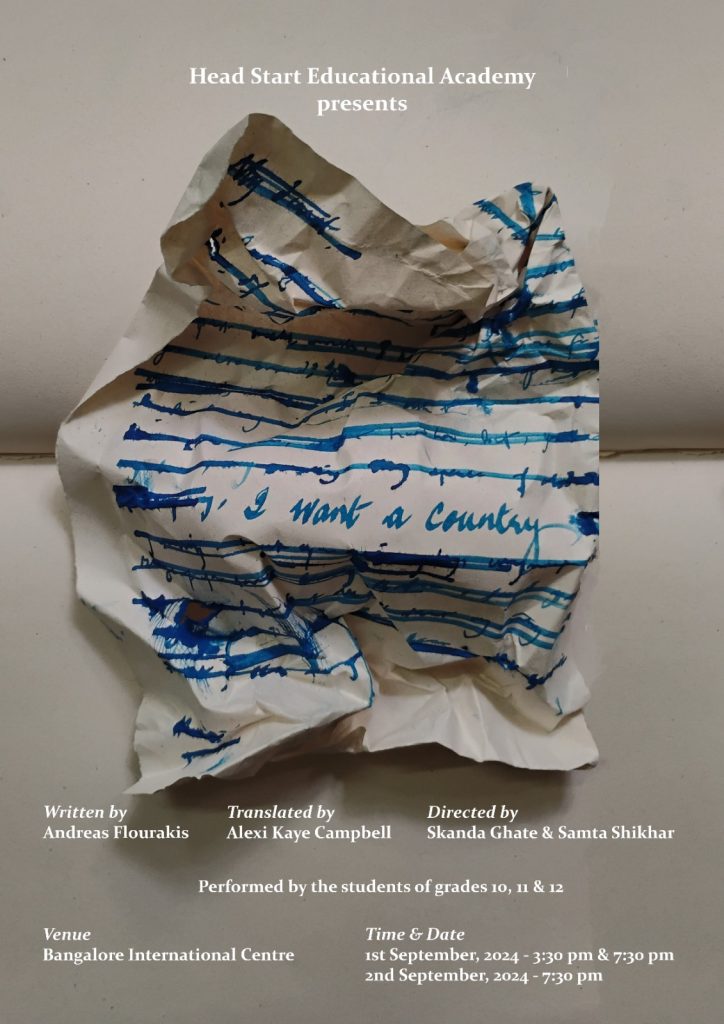
A Note from the Director
In June 2024, an enthusiastic bunch of 15 students entered the theatre rehearsal room and expressed their desire to make a play. Acting, writing, backstage work and all the elements of theatre excited them.
Three scripts were introduced over a week and after the readings, multiple discussions and conversations, “I Want a Country” by Andreas Flourakis resonated most with them. They went through the process of writing and re-writing scenes, improvising from the script and writing new scenes. The children owned the process, backstage to onstage!
The production took three months of rigorous rehearsals, including after school hours, and the learning was tremendous.
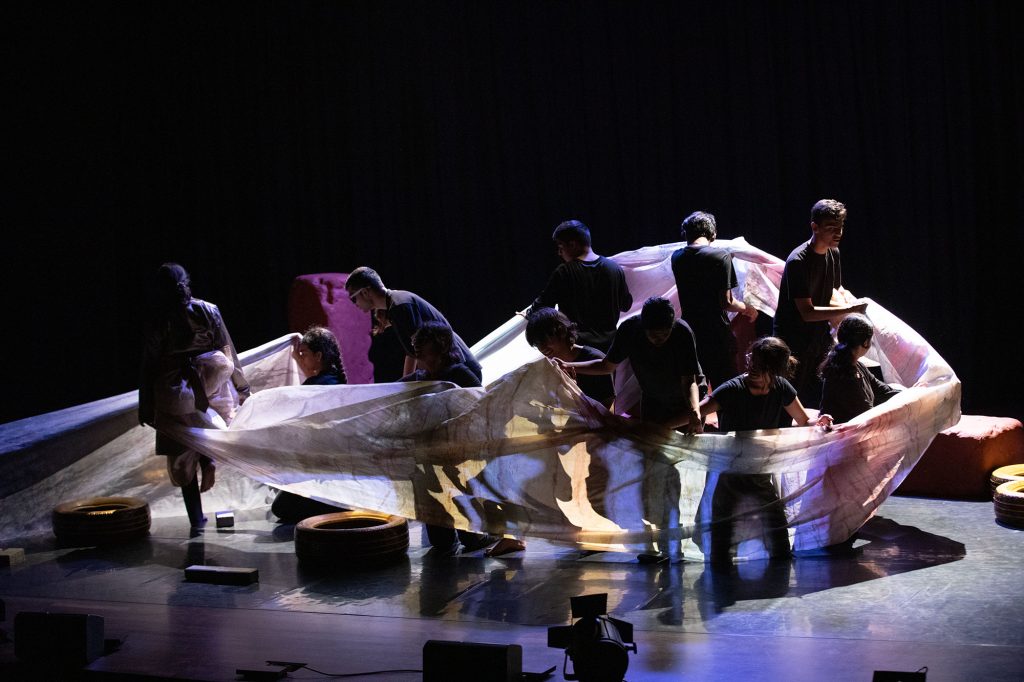
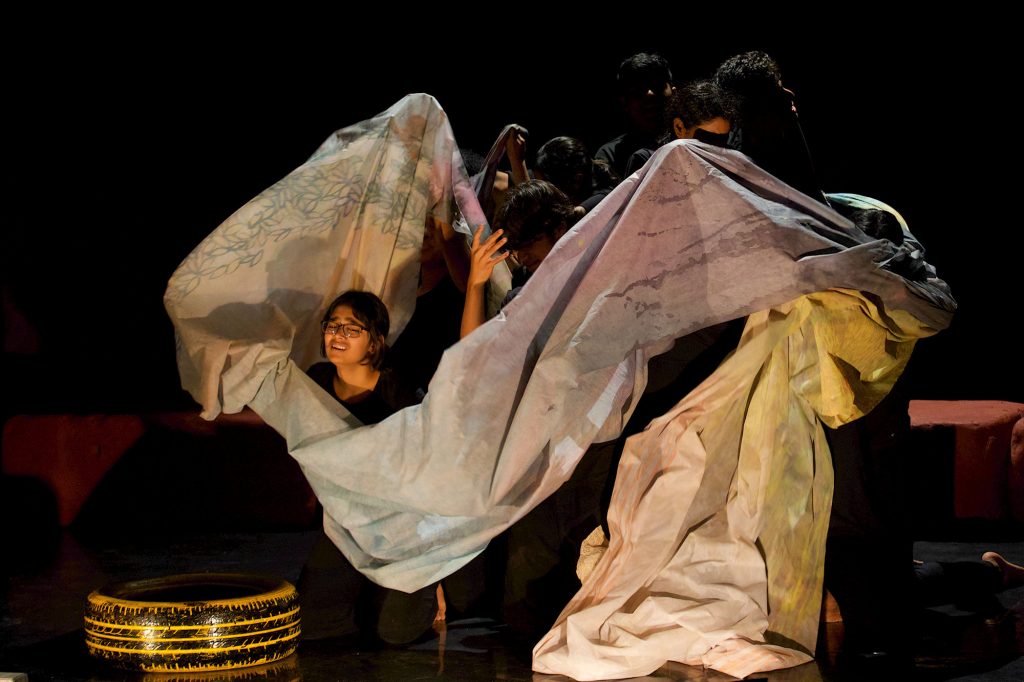
Actor’s Perspectives
Pranav Savla, Grade 12
The play’s exploration of a new idealistic country contrasted with the self-destructive tendencies of its creators, was something I felt passionately about. As someone who represents a minority (I am visually impaired) the script struck a personal chord with me. It felt like a mirror to my own experiences and desires, a way to channel my voice and my longing for a society that truly embodies the ideals I hold dear.
The script was more than just words on a page; it reflected my own hopes and frustrations. It allowed me to explore my identity and articulate my vision of a country where inclusivity and understanding prevail. Performing this play felt like stepping into a part of myself that I longed to express, where I didn’t have to adopt a persona but could instead bring my true self to the stage. It was a rare chance to voice my personal truths and to connect them with a broader narrative. It was about reflecting on our own contributions to the societal problems depicted.
The play delved into the complexities of our collective journey, illustrating how our greatest ideals can be undermined by our own actions and failings. It prompted me to think about the nature of human aspiration and the often tragic disconnect between our dreams and our reality. This reflection on the human predicament was not only intellectually stimulating but also emotionally resonant, allowing me to grapple with the broader questions of purpose, identity, and the impact we have on the world around us.
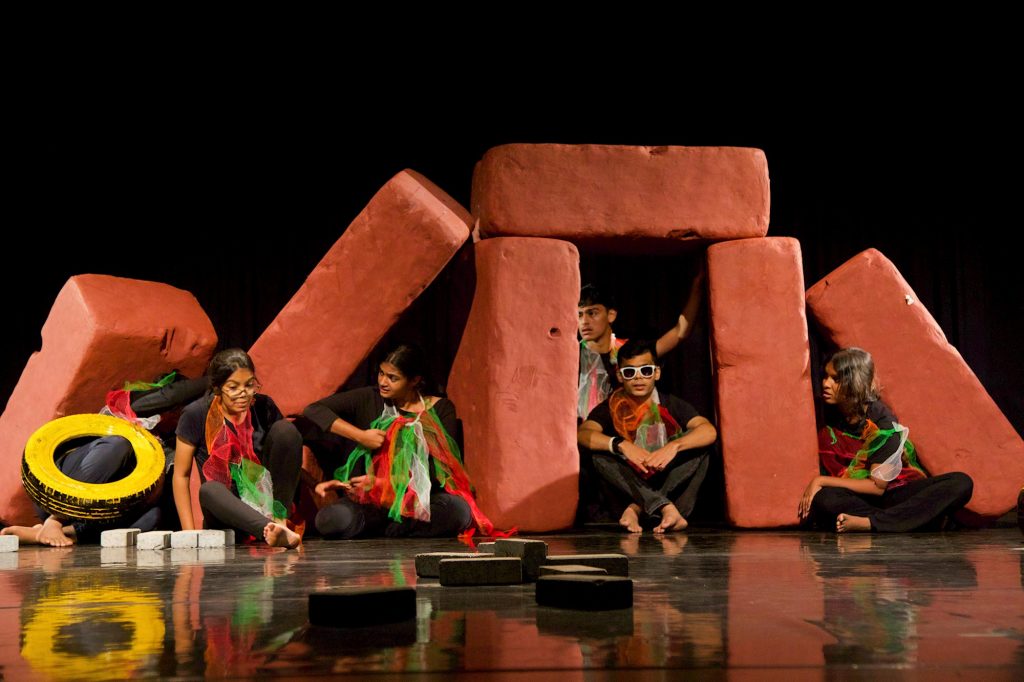
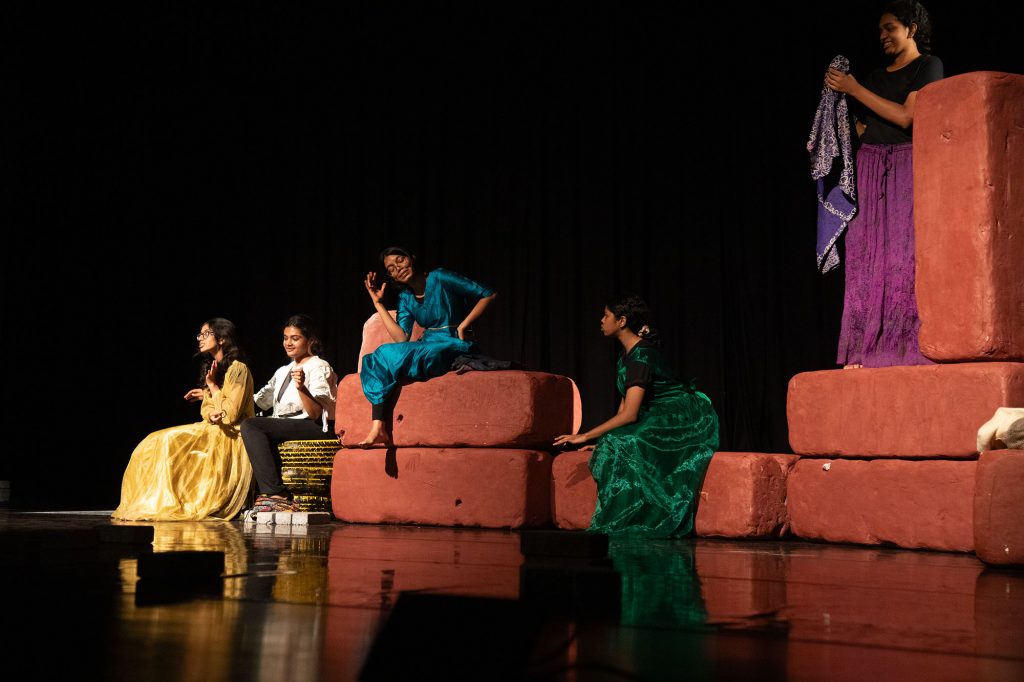
Shaivi Shah, Grade 11
The play talks about everything. From religion to old people to mobile homes, from TV to the weather, to depression. It makes us think about our societies, our futures, our lives.
The world is filled to the brim with disparities. Inequality is everywhere, in so many different manifestations. The play especially talks about this. Everything we do, in one way or the other, is affected by this community. Pressure is created when we make choices. The human predicament, or at least my understanding of it, revolves around the morality of our choices and actions. The quick dialogues and opposing views subtly highlight this. All these aspects led to my immediate attraction to the play. It called to me, my opinions and my voice. It adopted me just as much as I adopted it.
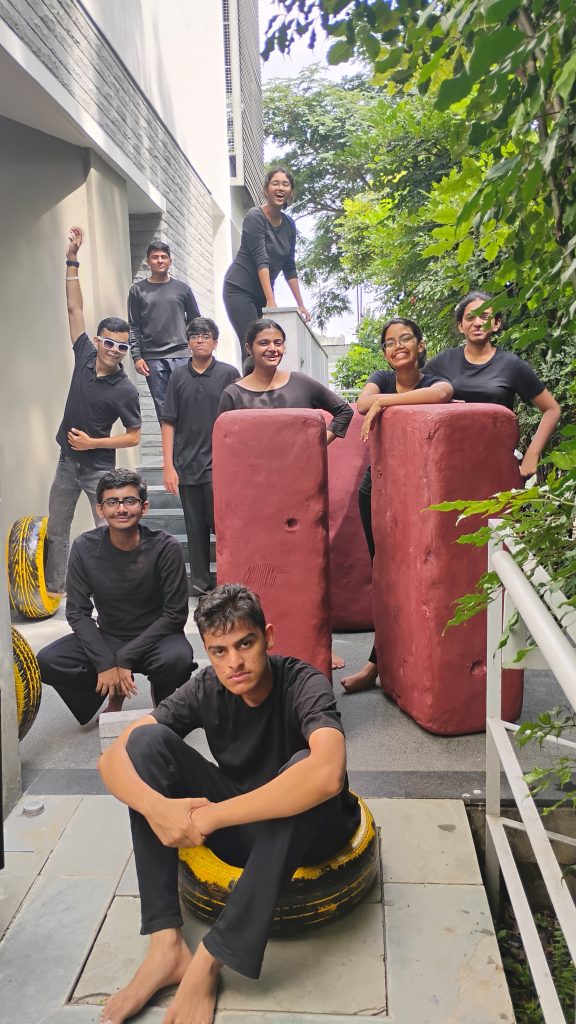
Arya Srinivas, Grade 10
I want a Country seemed the most interesting of the three options given, simply because of the amount of stuff we had to come up with. During the first read, the play made me think about things that I’ve never really thought about in the context of a play.
A play-script is generally detailed enough to allow one to imagine a rough idea of what a scene is supposed to look like, but here I drew a blank. I had no idea about what the form of the play was even supposed to be, let alone building whole scenes, and the thought of constructing them was really tempting. I’d be lying if I said I didn’t think a lot about an alternate option where we selected one of the other two scripts.
I want a Country was a lot of work and ninety percent of the effort never even made it to the final show, so I perhaps regretted our choice at times, but I still had fun working on it.
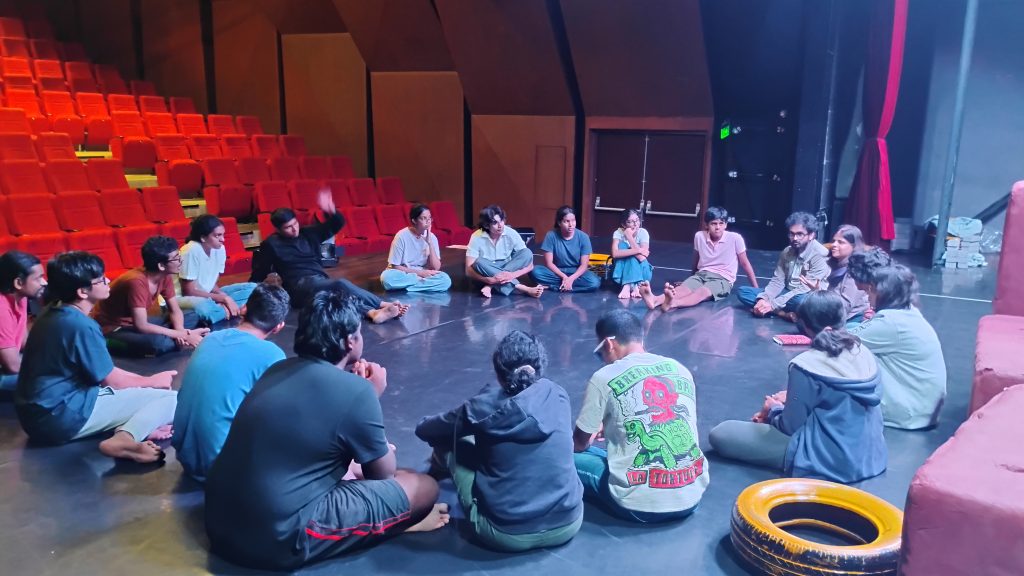
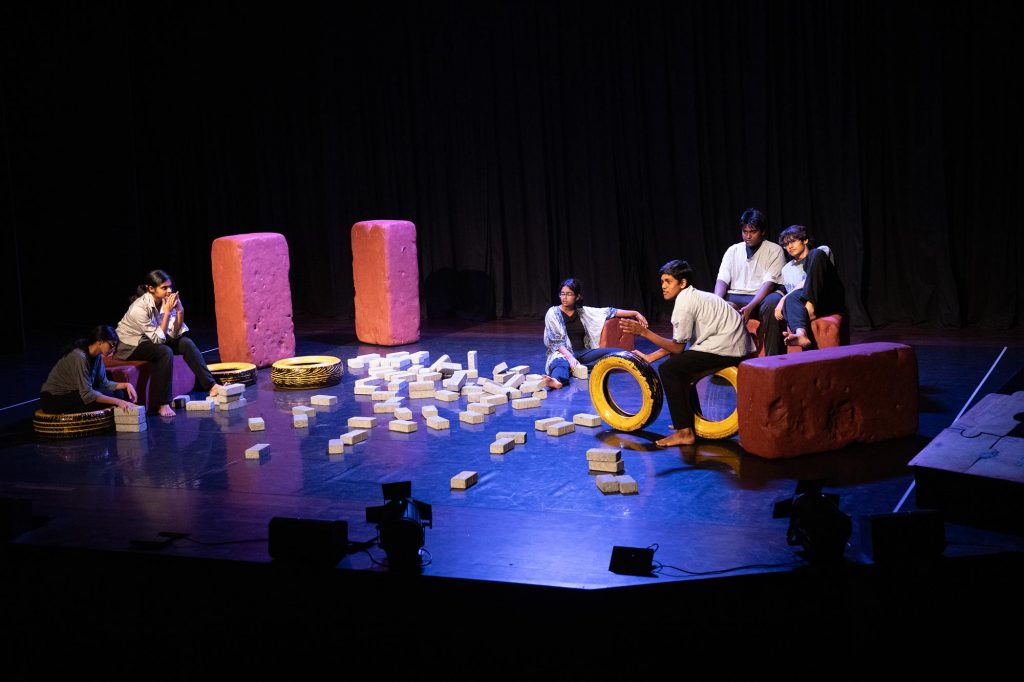
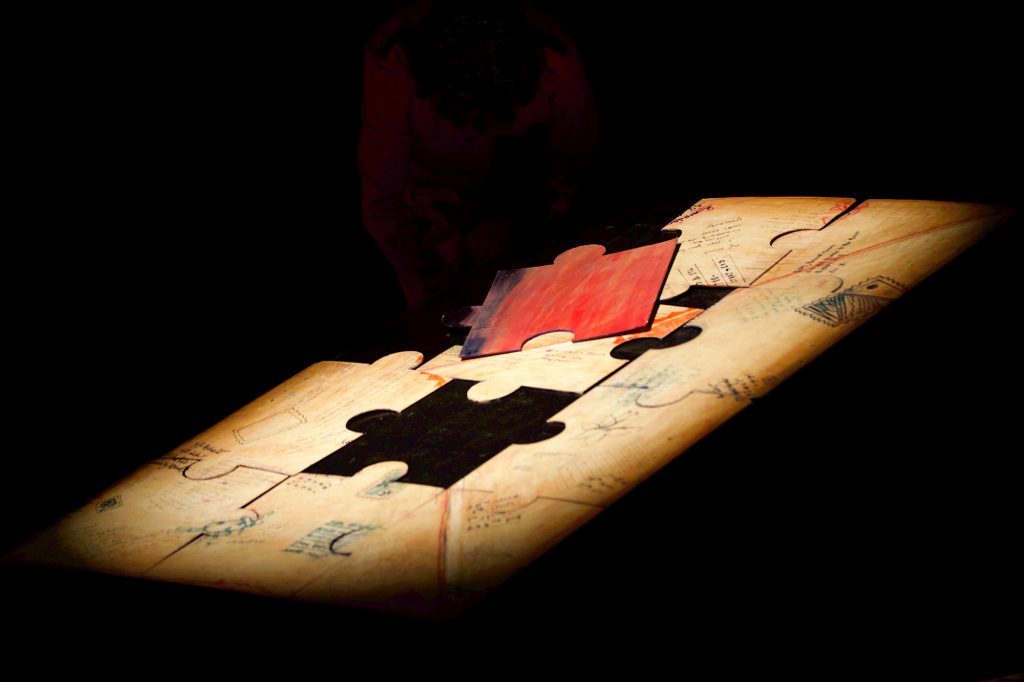
Diva Mandal, Grade 11
The Theatre group and I read the three suggested scripts but something about I Want a Country just clicked with us.
This play clearly portrayed the message, “The grass is greener on the other side.” No country is perfect. They all have their own good and bad apples. There is meaning behind the play which is universal in nature. While it was not about a particular country, it portrayed the unique nature of every country well.
Every scene began with a character wanting their country to be a specific way, but all the scenes were open to the reader/viewer’s interpretation. This was intriguing. For example, the dialogue “I want a country full of mobile homes” could be said by a rich/elite individual, a not so wealthy person, or even a spent café worker.
This play holds a very special place in my heart and being able to act in it was a pleasure. I discovered new ideas, made good friends and gained a lot of experience.
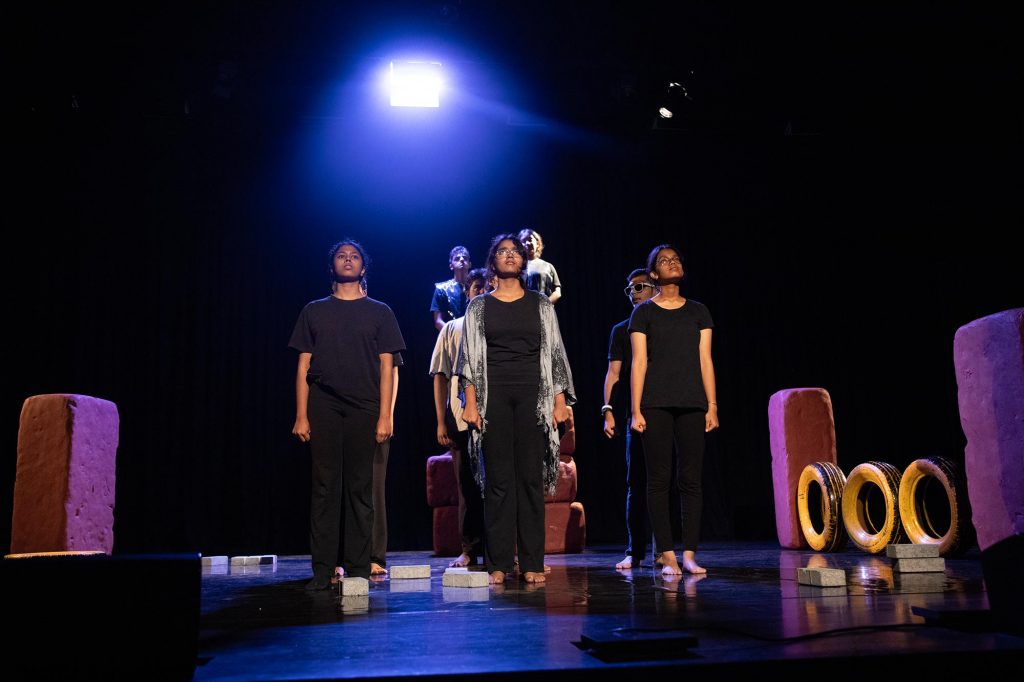
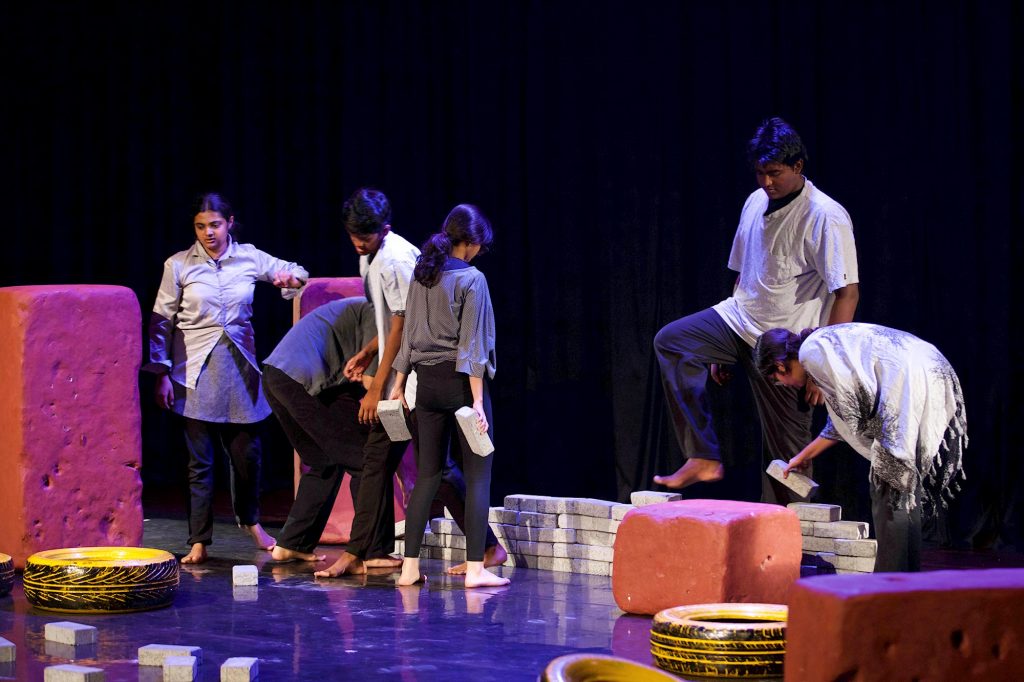
Kaushal Shah, Grade 11
As the script talks about and reflects on issues that are human-centric, it follows that one too must reflect to understand the emotional weight and scope that each issue holds. In doing so one gets entangled in the personal implications each issue brings up along with the insights they give into the human character.
The recurring theme which materialized came up through two questions behind every issue: Who? And Why? The Why was taken over by the writer while the Who was left up to the reader. However, the writer does give vague clues as to what the Who should be. The vagueness additionally offers the reader room to play around in.
Another simple idea that I found the script to be built around was the combination of sense with nonsense. The logical progression of each part where only a single issue is dealt with, is often interrupted with a nonsensical dialogue which has no relation to the context but is entirely whimsical. This tells us a lot about humans in general where we constantly move away from the topic at hand while simultaneously trying to address it because of our everlasting need of proving things right.
In one way, this divergence and final convergence is the creative process where we try to find a solution by looking at something from vastly different vantage points. But in another way this divergence never leads to convergence and occurs when we lose grasp of what we were trying to find a solution for. In short, the ego comes in the way.
Sometimes, only by excellent chance, we hit upon a crucial aspect, but it is rare to acknowledge such a flight if it ever comes by. A human’s success and excellence are majorly dependent on how we have mastered our creative process and are able to find solutions without letting personal biases get in the way. In short, don’t be a bigot with a big ego.
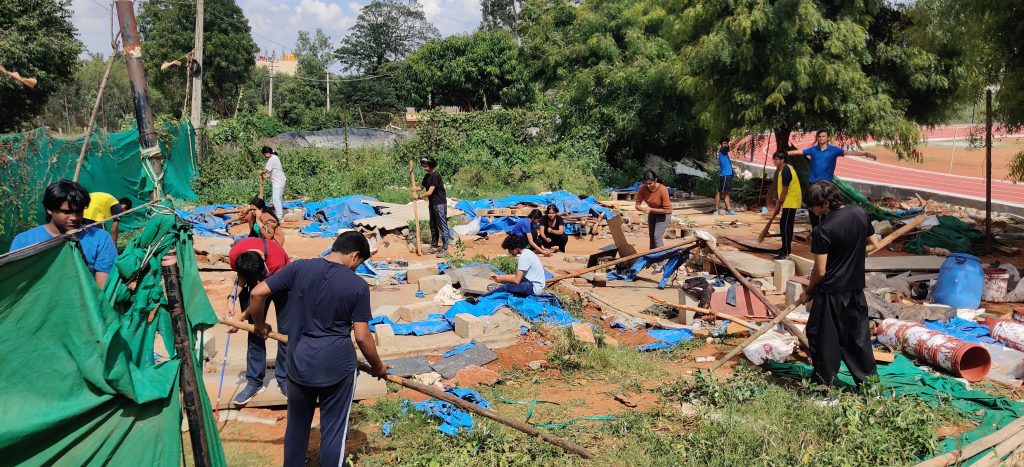
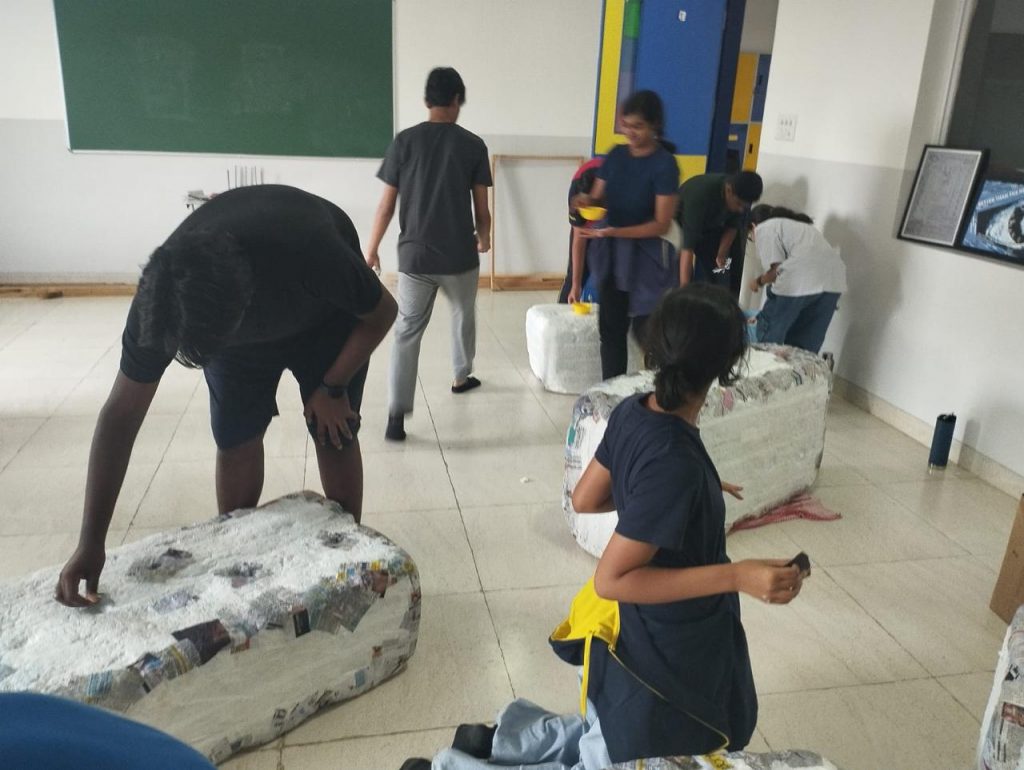
Dhwani Nagendra Suri, Grade 11
The play spoke about honest, everyday aspects of a country. It talked about important issues such as poverty, war and human nature. It spoke about how a country is, more than anything, deeply human and deeply flawed, and how one cannot separate a country from humanity.
The process really opened my eyes and made me internalize the messages of the play. The fact that it was so open to interpretation meant that we had lots of discussions about what society means for us. While looking at scenes, we discussed and argued about what kind of people would be saying which dialogues and why.
When we did decide on roles, we really had to think about characters/members of society we were playing, what kind of people they might be, how they would speak, move, look at other people. We had to think about how to set the scene, how to use our bodies, move props, and convey the emotion of the scene. The play opened up so many ways of expression, and I really internalized the play.
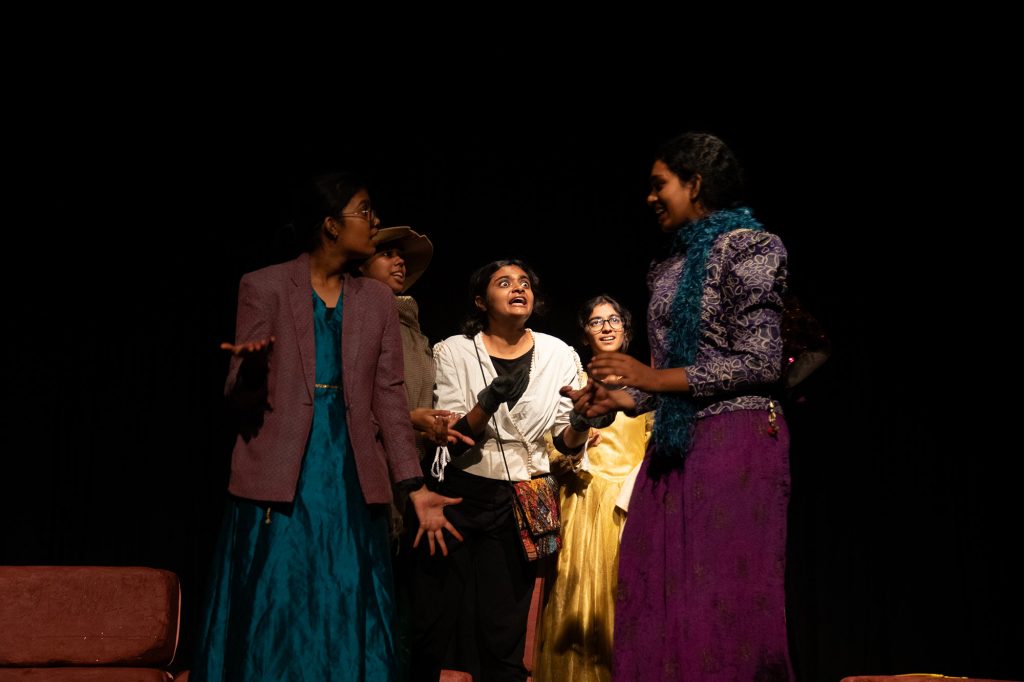
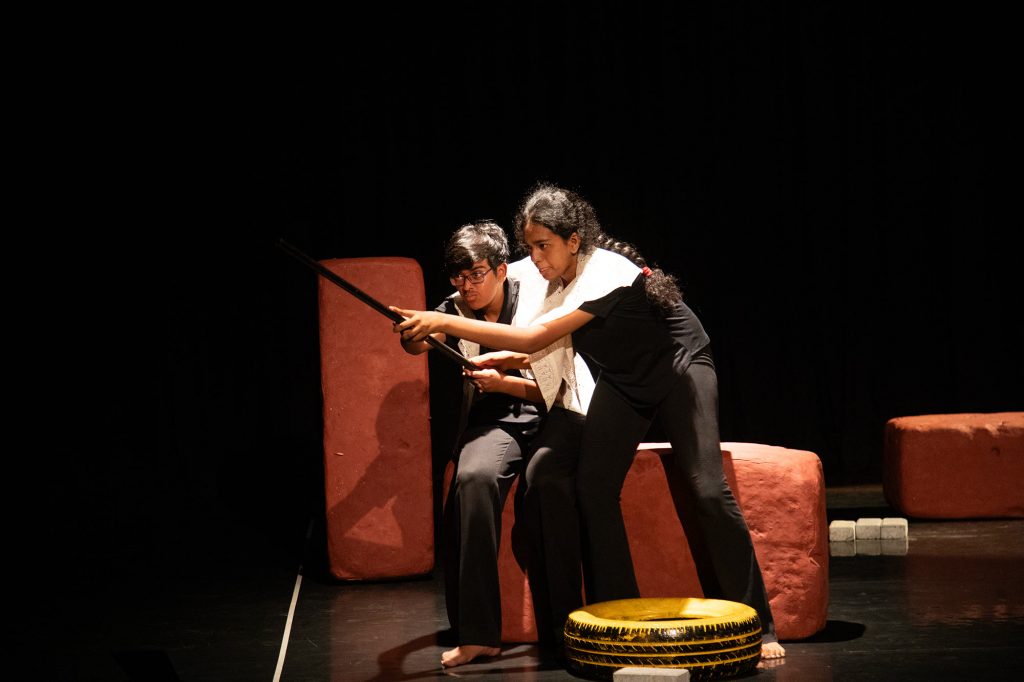
Varshini, Grade 12
Out of the three scripts, I want a Country had the most room to work with. It covered so many topics while still remaining entertaining theory. Since the format was something I had not come across before, I immediately started brainstorming about how we could perform this as a play. The message felt very relevant as I find myself constantly thinking about how one can bring about social change in today’s world.
The script helped me change how I think about bigotry. I am more willing now to have a discussion with those who hold strong beliefs rather than just ignore them.

Jai, Grade 10
The play introduced many new ideas to me which I was previously clueless about. It was very relatable to those of my age—15+. It meant a lot as those around me are constantly talking about which countries to apply for colleges in.
The play introduced the idea of the various problems countries have. It was a platform to express my interpretation of humanity’s desire to achieve perfection which is not always possible.
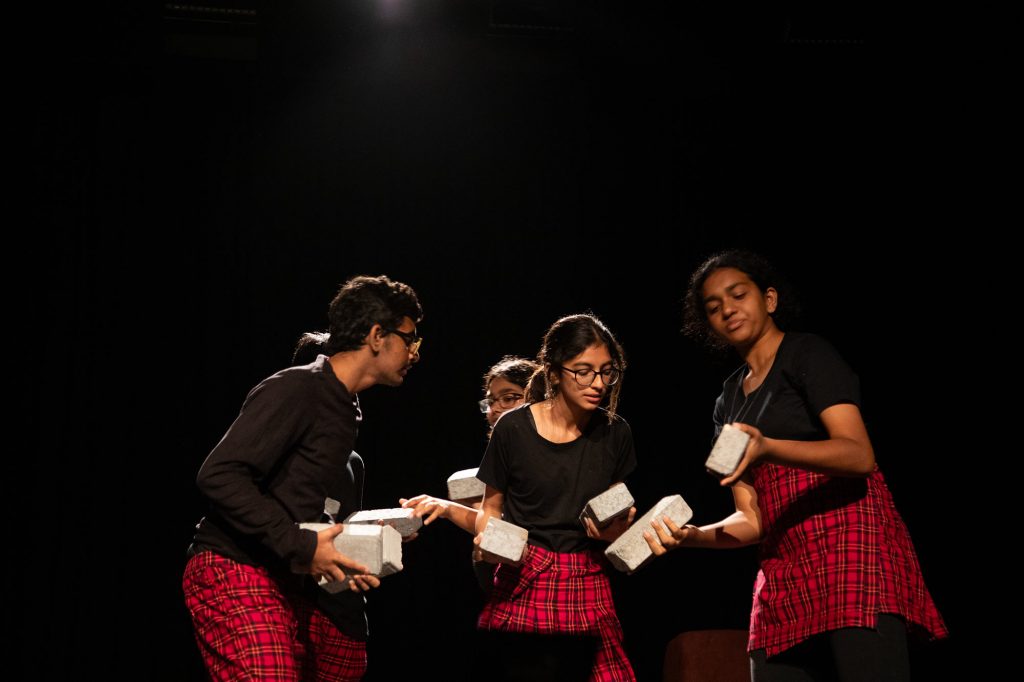
Audience Reviews
Kirtana Kumar is a Bangalore based theatre actor and director. She runs Little Jasmine Theatre Project and Theatre Lab (Youth). Their workspace is Infinite Souls Farm & Artists’ Retreat.
Most of the school plays are just an imitation of Disney or something to that effect and the intention is just to please parents, but rarely do they go into the souls of the students…like “I Want a Country” did!
What I liked the most was when the kids spoke at the end, about what they wanted in a country. It was meaningful and thought provoking and profound. It felt they quite owned the piece, they knew what they were doing and why and were committed to that.
Hetal Shah (school parent)
It was amazing to see students getting to experience the stage. The many things that theatre teaches you, the bonds made. A beautiful moving play.
Rajesh (school parent)
Writing this to let you know the immense joy I felt watching the play, I Want a Country.
It is one of the most political plays I have seen of late. In it, I could see India. I think it is a bold thing to do. More importantly, the kids! Our hope lies in them. They are so aware of the developments around and want to articulate without fear or fervour. The fact that they chose this script from the three they were given itself means a lot. Let their wishes come true! Kudos to everyone who was part of the production, especially Skanda and Samta. And, trust HSEA to produce such bold plays. Still remember Idhar, Udhar that was performed two years back.